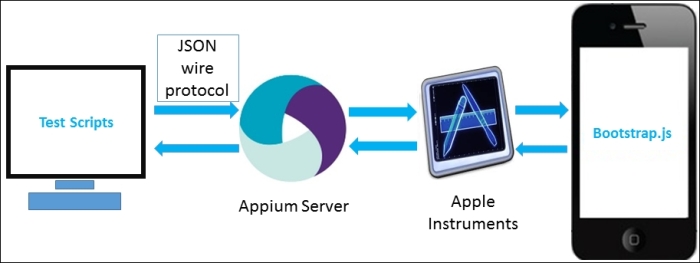Appium is an HTTP server written in Node.js that creates and handles WebDriver sessions. The Appium web server follows the same approach as the Selenium WebDriver, which receives HTTP requests from client libraries through JSON and then handles those requests in different ways, depending on the platform it is running on.
Let's discuss how Appium works in iOS and Android.
On an iOS device, Appium uses Apple's UIAutomation API to interact with the UI elements. UIAutomation is a JavaScript library provided by Apple to write test scripts; Appium utilizes these same libraries to automate iOS apps.
Let's take a look at the architecture, which is shown in the following diagram:

In the preceding diagram, when we execute the test scripts, it goes in the form of JSON through an HTTP request to the Appium server. The Appium server sends the command to the instruments, and the instruments look for the bootstrap.js file, which is pushed by the Appium server to the iOS device. Then, these commands execute in the bootstrap.js file within the iOS instruments' environment. After the execution of the command, the client sends back the message to the Appium server with the log details of the executed command.
A similar kind of architecture follows in the case of Android app automation. Let's discuss the Appium architecture for Android.
On an Android device, Appium uses the UIAutomator framework to automate the apps. UIAutomator is a framework that is developed by the Android developers to test the Android user interface.
Let's take a look at the architecture, which is shown in the following diagram:

In the preceding diagram, we have a UIAutomator/Selendroid in place of Apple instruments and bootstrap.jar in place of the bootstrap.js file.
Appium supports Android versions greater than or equal to 17; for earlier versions, it uses the Selendroid framework. When we execute the test scripts, Appium sends the command to the UIAutomator or Selendroid on the basis of the Android version.
Here, bootstrap.jar plays the role of a TCP server, which we can use to send the test command in order to perform the action on the Android device using UIAutomator/Selendroid.



